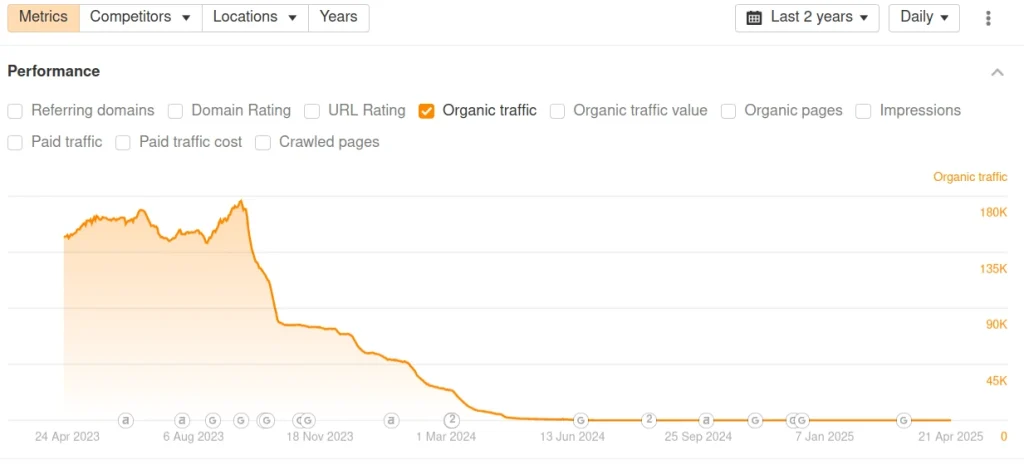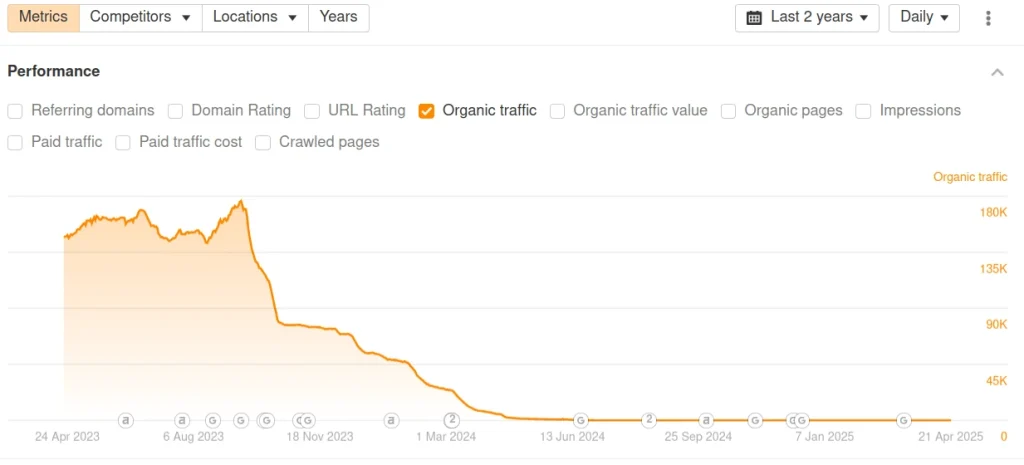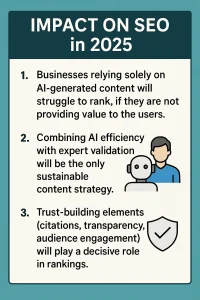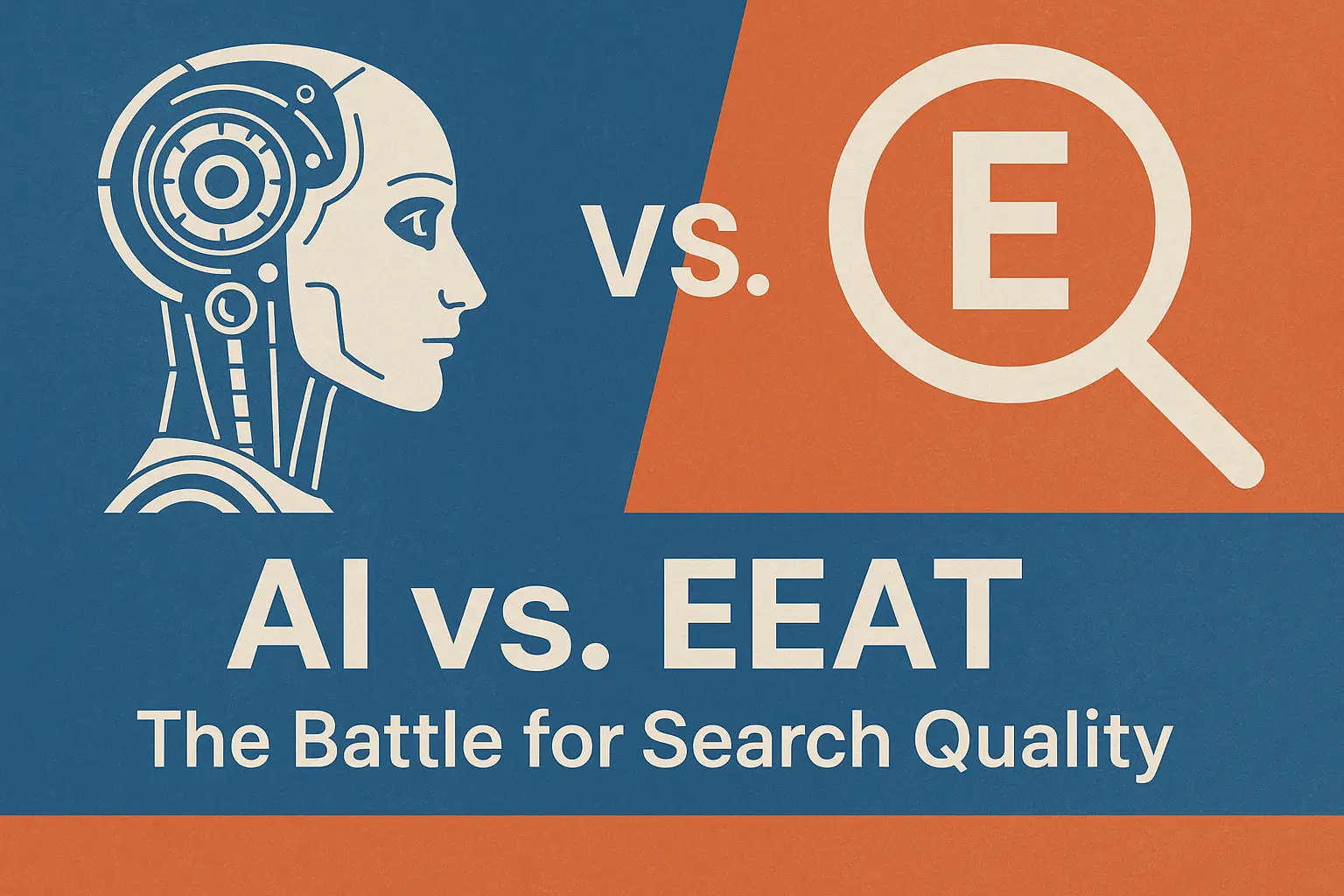Did you know that over 57% of webpage content was generated by AI in 2024?
It might sound hard to believe, but a study by Amazon Web Services, reported by Forbes, confirms this trend and the number is expected to reach 90% by the end of 2025.
But as AI churns out content at scale, Google is doubling down on its mission to prioritize quality over quantity.
AI Content vs. Google’s E-E-A-T
AI-generated content is scaling faster than ever, especially when used smartly and in accordance with Google’s AI-generated content guidelines. Businesses are mass-producing blog posts, product descriptions, and entire websites using AI tools like ChatGPT, Jasper, and SurferSEO. However, Google’s evolving algorithms are designed to filter out AI-heavy, low E-E-A-T content.
Core Observations:
- Thin, generic AI content will struggle to rank.
- Websites without credible authorship or real-world experience will lose visibility.
- Trust signals (expert citations, transparency, and user engagement) will be critical for rankings.
For businesses relying on AI, the question isn’t whether to use AI, but how to integrate it without sacrificing E-E-A-T.
In over 12 years of working in SEO, I’ve experienced every major algorithmic shift firsthand—from the days of Penguin and Panda to the recent Google updates. In the early 2010s, keyword stuffing was often enough to rank it on page one. But by 2018, the focus shifted toward expert-driven, well-researched content. Today, success in SEO demands more than just good writing—it requires a strategic approach. Incorporating a proven SEO strategy is now essential to ensure quality, stay compliant with evolving algorithms, and achieve sustainable rankings.
AI Content on the Rise: How Google’s Search Strategy Is Evolving
The explosion of AI-generated content has reshaped how search engines assess quality. In response, Google has refined its algorithms to reward real expertise, personal experience, and trustworthy information—shifting the focus from quantity to genuine value.
Let’s explore the Google strategies to fight low-value AI-generated content and improve search quality results in Google Search:
Google Algorithm: A Timeline of Key Updates to Fight Low Value & Thin AI content
Google Announced Helpful Content Update 2.0 (December 2022)
Google Added “Experience” to E-A-T (December 2022)
Google’s September 2023 Helpful Content Update 3.0
Google’s March 2024 Core & Spam Updates
December 2024 & March 2025 Core Update
Upgrade content quality rater guidelines
Google continuously brings out updates to improve search results. Let’s explore the updates in more detail below:
Google Announced Helpful Content Update 2.0 (December 2022)
In December 2022, Google rolled out its Helpful Content Update 2.0, directly addressing the thin content that is not providing value to the users. The update targeted websites that prioritized writing for search engines over users, especially those filled with low-value, AI-generated content.While analyzing the update, I observed a significant decline in organic traffic on multiple websites.
This is the official statement by Google:
“The update aims to better reward content where visitors feel they’ve had a satisfying experience, while content that doesn’t meet a visitor’s expectations won’t perform as well.”
Google Added “Experience” to E-A-T (December 2022)
Simultaneously, Google expanded its E-A-T framework to E-E-A-T, adding Experience as a core pillar. This update emphasized firsthand, practical knowledge (e.g., a chef sharing recipes vs. an AI rewriting generic instructions). The revised Quality Rater Guidelines stressed that E-E-A-T isn’t optional—it’s a non-negotiable ranking factor separating high-quality sites from low-effort competitors.
Google’s September 2023 Helpful Content Update 3.0
In September 2023, Google doubled down with its Helpful Content Update 3.0, A report by Search Engine Roundtable stated that after Google’s September 2023 Helpful Content Update, 22% of websites were impacted. Websites relying exclusively on AI-generated material devoid of human oversight or expertise, experience were drastically impacted by this.The update targeted websites that prioritized writing for search engines over users, especially those filled with low-value, AI-generated content.
While analyzing the update, I observed a significant decline in organic traffic on multiple websites. I’ve included a case study below for reference.
Case Study: ApprovedModems.org

ApprovedModems.org, a website focused on tech product reviews like modems and routers, saw a 35–40% drop in organic traffic after Google’s September 2023 Helpful Content Update. The main issue was that the site was created more for search engines than for users.
It prioritized affiliate earnings through links and ads rather than offering real value. Most of its content, such as “Top 10 Modems for Xfinity,” lacked hands-on reviews or unique insights, simply repeating specs that users could find on brand websites.
The site also lacked E-E-A-T—there were no expert authors, no real testing experience, and no transparency or trust signals. Readers had no reason to choose it over trusted sources like Netgear or Wirecutter, as it didn’t offer tutorials, comparisons, or helpful guides that answered user needs.
Case Study: TravelinUSA.us

TravelinUSA.us, a content-rich travel website, saw a sudden 30% drop in organic traffic after Google’s September 2023 algorithm update. Within just three days, several key articles vanished from the search results. Although the site’s owner mentioned that all content followed Google’s quality guidelines, the update seemed to target deeper structural issues.
The likely cause? While the site may have appeared compliant on the surface, it possibly lacked strong indicators of real-world experience and originality—two factors emphasized in Google’s evolving content standards. Articles may have been too generic, offering limited firsthand insight or failing to showcase author expertise and transparency.
With Google’s increased focus on E-E-A-T, travel content that doesn’t demonstrate authentic, experience-based value can quickly lose visibility—even if it appears helpful.
Google’s March 2024 Core & Spam Updates
March 2024 saw a core update and content spam update, aligning Google’s systems with E-E-A-T principles.Google aims to reduce low-quality content in search results while prioritizing trustworthy, expert advice and content backed by real experience, aligning with its E-E-A-T principles. These updates are expected to drive more traffic to high-quality, helpful sites. Based on evaluations, Google anticipates that this update, combined with previous efforts, will collectively reduce low-quality, unoriginal content in search results by 40%.
High-impact results include:
- Deindexing of spammy, AI-heavy websites.
- Traffic surges for trustworthy, user-focused platforms.
- Stricter enforcement of Webmaster Guidelines (e.g., scraping, keyword stuffing).
Here are the websites that were impacted by this update:
ZacJohnson.com: Launched in late 2023, this site focused on affiliate marketing and finance topics. It experienced rapid growth but was completely deindexed due to repetitive, AI-generated content.
Beingselfish.in: A health and wellness blog with poorly generated AI content and subpar design, leading to a significant drop in traffic.
Fresherslive.com: Once ranking for millions of keywords, it was entirely deindexed, resulting in zero organic visitors.
Source: https://coalitiontechnologies.com/
Google’s Latest Push for Search Quality: December 2024 & March 2025 Core Updates
In its ongoing mission to improve search quality and deliver genuinely helpful results to users, Google rolled out two significant core updates in December 2024 and March 2025. These updates were aimed at refining how Google’s systems evaluate content—giving more weight to content created by individuals with real expertise, personal experience, and authentic insights.
From E-A-T to E-E-A-T: Why Experience Matters More Than Ever
- Personal experience is now a most important factor to boost content visibility – A travel blog written by someone with firsthand experience of a destination offers authenticity and depth that a generic AI-generated guide simply can’t match. The human touch, personal stories, and real-world insights make it more relatable and trustworthy for readers.
- Medical content needs practitioner input – A health article written by a certified doctor will rank higher than AI-generated content.
- Financial Strategies from Industry Experts – Expert financial advice combines experience with industry knowledge to provide personalized strategies. Unlike generic AI-generated guidance, it ensures informed decisions for investments, savings, and long-term financial security.
- Authenticity beats automation – Google prioritizes content that offers genuine real-world insights over mere regurgitation of facts, ensuring valuable and authentic information for users.
- A marketing strategist brings real-world experience, sharing practical strategies shaped by hands-on success and challenges—something AI-generated content simply can’t replicate.
Impact on SEO in 2025:

AI Content Optimization: Aligning AI with E-E-A-T
AI is undoubtedly a powerful tool, revolutionizing content creation with speed and efficiency. However, content creators must strike the right balance between AI-driven automation and human expertise to meet Google’s E-E-A-T guidelines and AI-generated content guidelines. Google recently added AI generative definition in the search quality guidelines Google refers to as a helpful tool, though it acknowledges the potential for misuse.
The 70/30 Rule for AI Content
Many experts advocate for the 70/30 rule:
70% AI Efficiency, for:
- Researching trends and gathering data
- Structuring outlines and drafting initial versions
- Generating SEO-friendly headlines and meta descriptions
30% Human Refinement, for:
- Subject-matter experts review and edit the content
- Incorporate proprietary research, case studies, and expert insights
- Fact-check AI-generated content for accuracy and relevance
My Take on AI & Human Content Balance
During my research, I came across numerous blogs and expert opinions on the AI 70/30 rule, emphasizing a structured mix of AI and human-generated content. AI generated content will not be harmful if you will provide the real value to the users within the content, as stated by Danny Sullivan,
So if you’re an SEO trying to figure out how AI fits in with being successful or not on Google, you’re too focused on the tool not the content. Is the content you’re producing helpful, reliable and people-first in nature? That’s what we’re looking for: https://t.co/rIKwa9fs7R
— Danny Sullivan (@dannysullivan) November 7, 2022
Also on Google’s Search Liaison –
It’s still not correct that AI content will be “well-received by search engines,” at least for us. There’s lots of AI content on the web that doesn’t rank well and hence isn’t well received. AI content has no magic ranking powers. If *content* is helpful, then it might succeed.
— Google SearchLiaison (@searchliaison) July 18, 2023
That said, I acknowledge that many startups and product-based companies are now heavily reliant on AI-generated content. AI is undeniably the future of every industry, and its impact will continue to grow. Instead of strictly following a ratio, I believe AI should be used strategically—as a tool for research, idea generation, and workflow optimization—while ensuring human expertise remains at the core of content creation.
The key is not just to use AI, but to use it smartly, blending automation with genuine expertise to create content that is authentic, valuable, and trustworthy in the eyes of both users and search engines.
Proven Strategies to Strengthen E-E-A-T in AI-Generated Content
As Google continues refining its ranking algorithms, establishing Experience, Expertise, Authoritativeness, and Trustworthiness (E-E-A-T) is crucial for content visibility in 2025. You can read the Reddit community conversation on whether Google is penalizing AI content and understanding its limits. To ensure AI-generated content meets these credibility standards, implement the following key tactics:
Showcase Author Credentials: Clearly display the author’s qualifications, expertise, and industry experience. Link to their professional profiles, such as LinkedIn or published work, to establish authenticity.
Incorporate Expert Insights: Strengthen content authority by including expert interviews, video/audio snippets, and quotes from recognized professionals within the field.
Use Transparent and Trustworthy Sources: Cite high-authority sources such as .gov, .edu, and peer-reviewed studies to enhance content reliability and credibility. Avoid misleading or unverified information.
Leverage User-Generated Content: Build trust by integrating client testimonials, Q&A forums, and community-driven discussions. Encouraging real user engagement reinforces authenticity and credibility signals.
By implementing these tactics, AI-generated content can align with Google’s E-E-A-T standards, ensuring higher rankings, improved trust, and long-term content success.
Predictions & Prep
Google May Launch E-E-A-T Scoring Tool to Combat Low-Value AI Content
Google may introduce E-E-A-T scoring plugins or tools to help webmasters measure expertise, experience, authoritativeness, and trustworthiness in their content (Just like PageSpeed Insights). As AI-generated content floods the internet, Google needs a reliable way to differentiate high-quality, expert-driven content from low-value, unverified information.
To Build Trust, AI Content Might Need Clear Human Review Disclaimers
AI content disclaimers may become mandatory, requiring clear labels such as “Reviewed by Dr. X” to indicate human oversight and verification of AI-generated content. This would enhance transparency, build user trust, and ensure credibility, helping distinguish expert-reviewed information from purely AI-generated material.
Actionable Steps to Strengthen E-E-A-T in Your Content
To align with Google’s evolving E-E-A-T (Experience, Expertise, Authoritativeness, and Trustworthiness) standards and improve content credibility, take these key actions:
Conduct a Comprehensive Content Audit:
Identify gaps in experience, expertise, and trust signals within your existing content. Ensure all claims are backed by authoritative sources and real-world insights.
Collaborate with Industry Experts:
Partner with recognized professionals, subject-matter experts, or thought leaders to co-author or review content. Featuring expert contributions enhances credibility and builds audience trust.
Leverage Schema Markup for Enhanced Visibility:
Implement structured data to highlight author credentials, peer reviews, and expert verification in search results. This not only strengthens trustworthiness but also improves click-through rates and rankings.
By proactively integrating these steps, your content will stand out as authentic, reliable, and aligned with Google’s quality standards—boosting both visibility and engagement.
By proactively aligning with these changes, your content will remain relevant, trustworthy, and competitive in 2025 and beyond.
Conclusion: The Synergy of Humans + AI
AI is a powerful tool, but it’s not a substitute for expertise. The key to winning in 2025 is not choosing between AI and E-E-A-T but mastering the balance between the two.
To stay ahead:
- Leverage AI for efficiency but ensure human expertise refines the content.
- Prioritize real-world experience, expert insights, and transparent sourcing.
- Future-proof your content strategy by aligning with Google’s evolving standards.
Are you a startup or business owner looking to grow your brand and reach more customers? We’re here to help you take the next step!
Evon Technologies is a software development company in India, offering top-quality digital marketing services. We help businesses and startups grow with smart, effective digital solutions tailored to their goals. Get in touch with us at sales@evontech.com and let’s build your success together.



 ISO 27001 : 2022
ISO 27001 : 2022








